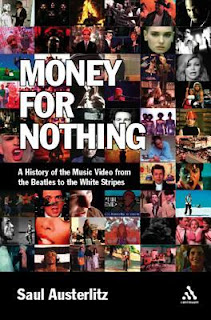 [UPDATE FEB 2017 -scroll down for Weird Al discussion] This is a topic I've frequently touched upon, so you should also look at this post on Weezer...
[UPDATE FEB 2017 -scroll down for Weird Al discussion] This is a topic I've frequently touched upon, so you should also look at this post on Weezer...As its such a useful example, I've referenced it in further posts on this topic (and others): use the tag!
The excellent, very readable, history of the music video by Austerlitz discusses this video - it really is worth having a flick through the index ... or just reading the book from scratch! [tag; specific post on the book]
Then there's a Robert Palmer example of intertextuality, a tag applied even more frequently than (queer theorist; gender as performativity) Judith Butler I see...
If I asked you now to think about 'the 60s', chances are you'd think of hippies, flower power, the Stones ... many of the iconic 60s festivals were actually in the 70s, ditto many of the Stones classics thought of as 60s, while the metropolitan (major city) drug phenomenon took until the 1970s to spread further into towns and cities across Western countries, beyond London, San Fransisco etc. The 60s ended around 1974?! Maybe 1973?!
---------------------------------------------------------------------------------------------------------------------
A pastiche is a work of visual art, literature, theatre, or music that imitates the style or character of the work of one or more other artists.[1] Unlike parody, pastiche celebrates, rather than mocks, the work it imitates.[2] [Wiki]
As we were discussing Baudrillard's concept of the simulacra, and Austerlitz's examples of postmodern videos (click on the various tags for these posts), I highlighted another artist who embodies this approach in his mimicking of famous artists and iconic videos, Weird Al Yankovich.
Self-parody is another layer of this; see my post on Depeche Mode's Its No Good for a great example of this.I've embedded the videos we looked at below. First, here's a useful PowerPoint (by another teacher) on the difference between parody (mocking the conventions being satirised) and pastiche (a more positive reflection of these)
WEIRD AL YANKOVICH
There are additional layers to the parody (these are surely somewhat barbed 'tributes'?) here. Yankovich plays on the stereotype of the neurotic American Jew that Woody Allen has embodied as a cultural trope, thus asserting a clear identity or brand even within the Michael Jackson parodies that follow.
You can put Yankovich in context by thinking of him as the Leslie Nielsen (Airplane, Naked Gun) or Wayans brothers (Scary Movie) of the music video world ... although its worth flagging up that since his peak chart years UGC and fan-made videos have soared in popularity.
Eat It is part of an extensive playlist of his videos; I'll embed this and Fat as the examples we considered.
Fat
Yankovich's Vevo channel.
UPDATE, FEB 2017: Having looked at this again yesterday, I noted another probable layer of intertextuality, a further simulacrum, with the group The Fat Boys - a now obscure reference that very few are likely to follow today as part of a preferred reading.
...
No comments:
Post a Comment